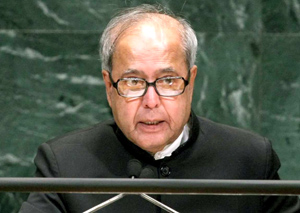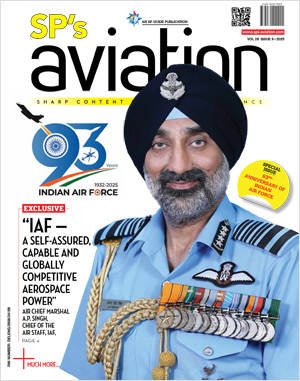INDIAN ARMED FORCES CHIEFS ON OUR RELENTLESS AND FOCUSED PUBLISHING EFFORTS

The insightful articles, inspiring narrations and analytical perspectives presented by the Editorial Team, establish an alluring connect with the reader. My compliments and best wishes to SP Guide Publications.

"Over the past 60 years, the growth of SP Guide Publications has mirrored the rising stature of Indian Navy. Its well-researched and informative magazines on Defence and Aerospace sector have served to shape an educated opinion of our military personnel, policy makers and the public alike. I wish SP's Publication team continued success, fair winds and following seas in all future endeavour!"

Since, its inception in 1964, SP Guide Publications has consistently demonstrated commitment to high-quality journalism in the aerospace and defence sectors, earning a well-deserved reputation as Asia's largest media house in this domain. I wish SP Guide Publications continued success in its pursuit of excellence.
- A leap in Indian aviation: Prime Minister Modi inaugurates Safran's Global MRO Hub in Hyderabad, Calls It a Milestone
- All about HAMMER Smart Precision Guided Weapon in India — “BEL-Safran Collaboration”
- India, Germany deepen defence ties as High Defence Committee charts ambitious plan
- True strategic autonomy will come only when our code is as indigenous as our hardware: Rajnath Singh
- EXCLUSIVE: Manish Kumar Jha speaks with Air Marshal Ashutosh Dixit, Chief of Integrated Defence Staff (CISC) at Headquarters, Integrated Defence Staff (IDS)
- Experts Speak: G20 Summit: A Sign of Global Fracture
Advantage Islamabad

Once it had been ascertained that Pakistan was involved in the Mumbai atrocity, some concrete action should have been taken immediately to launch precision aerial attacks against the terrorist camps.
The terrorist infrastructure in Pakistan is the greatest terrorist danger to peace and security of the entire civilised world.
—Pranab Mukherjee, India’s External Affairs Minister
Mohammad Ajmal Amir Iman, aka Qasab (Butcher, in the literal sense), the lone terrorist survivor of Mumbai’s 26/11 terror attack apprehended by security forces during the 60-hour action was singing like the proverbial canary in the interrogation cells of Arthur Road jail. Declaring himself a Pakistani national from Faridkot in Pakistan, he elaborated on how and where he was trained and tasked by the Lashkar-e-Toiba (LeT) to commit the ghastly crime. If that was not enough, fire arms and hand-grenades, cell phones and SIM-cards, even items of daily utility—milk powder, toothpaste, shaving creams and even toilet paper—had Pakistan written all over them. As the evidence poured in, Prime Minister Manmohan Singh’s demand for Pakistan to send ISI Chief Lt General Shuja Pasha to be part of the investigation was quickly agreed to by Pakistan President Asif Ali Zardari. In his exuberance (real or affected) to cooperate with the Indian government, Zardari had evidently forgotten to consult (read, take permission) from the top brass of the country’s military establishment. Pakistan Army Chief General Ashfaq Parvez Kayani was reported to have commented contemptuously: Next, they (India) would be asking for me to go there.
Pakistani leaders were quick to move away from cooperating with India’s investigation into the Mumbai terror attacks, moving swiftly into what may best be described as a total state of denial. Plausible deniability is a most-practiced doctrine of Pakistan’s ISI-jehadi structure but the version it adopted in the wake of the Mumbai attacks was best dubbed by one of India’s leading news dailies in a single stinging word—Dubiya. A continuous stream of contradicting statements from the highest political leadership, eagerly aided by different levels of Pakistan media, has made such a mockery of the entire issue that it is getting more implausible by the day. President Zardari went to the extent of denying that Qasab was from Pakistan despite the latter’s own testimony corroborated by reports in the UK and Pakistani press based on interviews with his father who is a resident of Faridkot and who recognised his son from the photographs splashed in the media. That should have been enough to spark an investigation in Pakistan, but security agencies there have instead cracked down on dissenting voices and stopped the entry of journalists and outsiders into the area. Hamid Amir, Editor of Geo Channel in Islamabad, who dared to telecast Qasab’s father from Faridkot in Okara district identifying his son as the captured terrorist of 26/11, was slapped with a court case on December 19. I am being observed with great attention and no one has killed me yet, he said.
Working alongside Indian sleuths and with the aid of hightech investigative tools, the FBI has also collected clinching and incontrovertible proof that the Mumbai terror attack was planned on and launched from Pakistani soil and by Pakistanis. However, despite foolproof evidence and seemingly immune mounting international pressure to move against LeT terrorists responsible for 26/11, Islamabad relentlessly pursues operation cover-up. Even after a Pakistani official confirmed that Zarar Shah, an LeT kingpin picked up after 26/11, confessed that he helped plan the attacks, Islamabad refuses to acknowledge the stark truth staring in its face.





